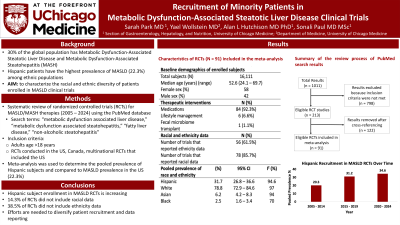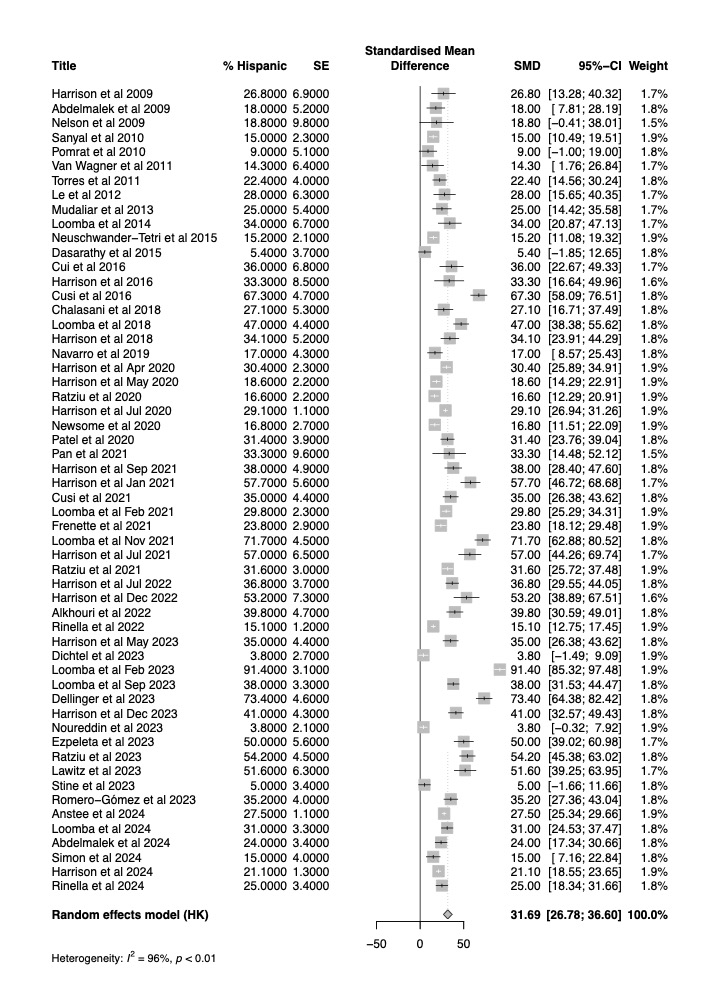Tuesday Poster Session
Category: Liver
P4578 - Recruitment of Minority Patients in Metabolic Dysfunction-Associated Steatotic Liver Disease Clinical Trials
Tuesday, October 29, 2024
10:30 AM - 4:00 PM ET
Location: Exhibit Hall E

Has Audio
- SP
Sarah Park, MD
University of Chicago Medicine
Chicago, IL
Presenting Author(s)
Sarah Park, MD, Yael Wollstein, MD, Alan L. Hutchison, MD, PhD, Sonali Paul, MD, MSc
University of Chicago Medicine, Chicago, IL
Introduction: Metabolic dysfunction-associated steatotic liver disease (MASLD) and steatohepatitis (MASH) are the second leading indications for liver transplant in the United States. The prevalence is unevenly distributed across ethnic groups with 22.3% of Hispanic patients disproportionately affected in the United States. This study aimed to assess racial and ethnic diversity among MASLD clinical trials.
Methods: We performed a systematic review of randomized controlled trials (RCTs) of MASLD/MASH therapies in the US and Canada from 2005-2024. Multinational RCTs involving the US were included. Data including patient age, sex, race/ethnicity, and therapeutic intervention type were collected. Meta-analysis was used to determine the pooled prevalence of different racial and ethnic groups. Descriptive statistics were used to compare racial and ethnic trial inclusion to previously reported MASLD prevalences in the US.
Results: Ninety-one RCTs met inclusion criteria. The studied therapeutics included medications (n=84), lifestyle interventions (n=6), and fecal microbiome transplant (n=1). When reported, the median age of study participants was 52.6 years (24.1 - 69.7) with 58% female subjects. Seventy-eight studies (85.7%) reported racial data and fifty-six (61.5%) included ethnicity data. Among the 16,111 patients enrolled in these trials, 3,298 (20.5%) were of Hispanic ethnicity. Meta-analysis revealed a pooled prevalence of 78.8% in white patients (95% CI 72.9 – 84.6, I2 = 97%), 6.2% in Asian patients (95% CI 4.15 – 8.31, I2 = 94%), and 2.5% in black patients (85% CI 1.58 – 3.44, I2 = 70%). Pooled prevalence of Hispanic patients was 31.7% (95% CI 26.8 - 36.6, I2 = 94.6%). This prevalence was higher than the reported national Hispanic prevalence of 22.3%, which may be partially explained by the substantial heterogeneity in the analysis. Hispanic enrollment also increased over time from 20% (2009 – 2014), 31% (2015 – 2019), to 35% (2020 – 2024).
Discussion: While the majority of studies reported data on participant race, only 61.5% included ethnicity. Since MASLD disproportionately affects Hispanic patients, it is imperative that clinical trials make a targeted effort to diversify patient recruitment. Compared to previous efforts, this study shows that trials are increasingly including Hispanic patients, yet need to increase inclusion of ethnicity data.

Disclosures:
Sarah Park, MD, Yael Wollstein, MD, Alan L. Hutchison, MD, PhD, Sonali Paul, MD, MSc. P4578 - Recruitment of Minority Patients in Metabolic Dysfunction-Associated Steatotic Liver Disease Clinical Trials, ACG 2024 Annual Scientific Meeting Abstracts. Philadelphia, PA: American College of Gastroenterology.
University of Chicago Medicine, Chicago, IL
Introduction: Metabolic dysfunction-associated steatotic liver disease (MASLD) and steatohepatitis (MASH) are the second leading indications for liver transplant in the United States. The prevalence is unevenly distributed across ethnic groups with 22.3% of Hispanic patients disproportionately affected in the United States. This study aimed to assess racial and ethnic diversity among MASLD clinical trials.
Methods: We performed a systematic review of randomized controlled trials (RCTs) of MASLD/MASH therapies in the US and Canada from 2005-2024. Multinational RCTs involving the US were included. Data including patient age, sex, race/ethnicity, and therapeutic intervention type were collected. Meta-analysis was used to determine the pooled prevalence of different racial and ethnic groups. Descriptive statistics were used to compare racial and ethnic trial inclusion to previously reported MASLD prevalences in the US.
Results: Ninety-one RCTs met inclusion criteria. The studied therapeutics included medications (n=84), lifestyle interventions (n=6), and fecal microbiome transplant (n=1). When reported, the median age of study participants was 52.6 years (24.1 - 69.7) with 58% female subjects. Seventy-eight studies (85.7%) reported racial data and fifty-six (61.5%) included ethnicity data. Among the 16,111 patients enrolled in these trials, 3,298 (20.5%) were of Hispanic ethnicity. Meta-analysis revealed a pooled prevalence of 78.8% in white patients (95% CI 72.9 – 84.6, I2 = 97%), 6.2% in Asian patients (95% CI 4.15 – 8.31, I2 = 94%), and 2.5% in black patients (85% CI 1.58 – 3.44, I2 = 70%). Pooled prevalence of Hispanic patients was 31.7% (95% CI 26.8 - 36.6, I2 = 94.6%). This prevalence was higher than the reported national Hispanic prevalence of 22.3%, which may be partially explained by the substantial heterogeneity in the analysis. Hispanic enrollment also increased over time from 20% (2009 – 2014), 31% (2015 – 2019), to 35% (2020 – 2024).
Discussion: While the majority of studies reported data on participant race, only 61.5% included ethnicity. Since MASLD disproportionately affects Hispanic patients, it is imperative that clinical trials make a targeted effort to diversify patient recruitment. Compared to previous efforts, this study shows that trials are increasingly including Hispanic patients, yet need to increase inclusion of ethnicity data.

Figure: Pooled prevalence of Hispanic patients among studies that reported ethnicity data
Disclosures:
Sarah Park indicated no relevant financial relationships.
Yael Wollstein indicated no relevant financial relationships.
Alan Hutchison indicated no relevant financial relationships.
Sonali Paul: Intercept – Grant/Research Support. TARGET PharmaSolutions – Grant/Research Support.
Sarah Park, MD, Yael Wollstein, MD, Alan L. Hutchison, MD, PhD, Sonali Paul, MD, MSc. P4578 - Recruitment of Minority Patients in Metabolic Dysfunction-Associated Steatotic Liver Disease Clinical Trials, ACG 2024 Annual Scientific Meeting Abstracts. Philadelphia, PA: American College of Gastroenterology.
